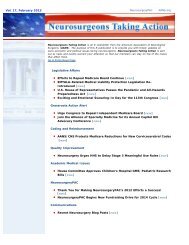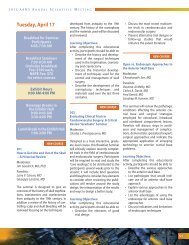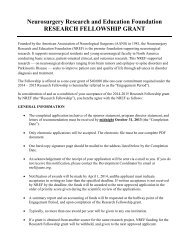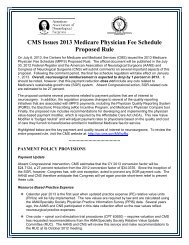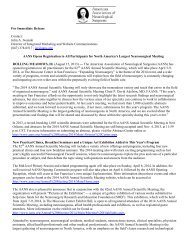view PDF - American Association of Neurological Surgeons
view PDF - American Association of Neurological Surgeons
view PDF - American Association of Neurological Surgeons
Create successful ePaper yourself
Turn your PDF publications into a flip-book with our unique Google optimized e-Paper software.
M EDICOLEGALU PDATE J EFFREY S EGAL, MD, AND M ICHAEL J . S A COPULOS, JD<br />
Can Contracts Preclude Frivolous Lawsuits<br />
Precedent Suggests Yes, When Carefully Crafted and Introduced<br />
Frivolous malpractice claims are expensive<br />
and time-consuming. What<br />
remedies are available to physicians<br />
who fall prey to such lawsuits<br />
One remedy is to file a suit against the<br />
plaintiff and his or her attorney using the<br />
tort <strong>of</strong> malicious prosecution. However, a<br />
key element for prevailing is proving that<br />
the attorney filed the case with malice,<br />
which is difficult to do. In addition, courts<br />
generally grant plaintiffs and attorneys<br />
wide latitude in pursuing claims <strong>of</strong> malpractice.<br />
Hence, malicious prosecution is a<br />
remedy rarely used.<br />
Contract law, which is separate from<br />
tort law, is another avenue <strong>of</strong> redress for<br />
physicians to investigate. This article will<br />
explore the ability <strong>of</strong> contract law to protect<br />
physicians from frivolous lawsuits.<br />
Making Contracts Enforceable<br />
To help explain what should work, it is first<br />
useful to describe what will not work. Asking<br />
a patient to forego all remedies is not a<br />
workable solution. For example, demanding<br />
that a patient not sue for any reason will<br />
not be enforceable. Public policy dictates<br />
that patients must have some remedy for<br />
negligence. That remedy is usually through<br />
the courts, although arbitration is another<br />
viable option. Having a patient sign a blanket<br />
release would be considered an “abuse<br />
<strong>of</strong> power,” and courts routinely have dismissed<br />
such agreements.<br />
If, however, the demands <strong>of</strong> a contract<br />
are narrower, the contract should withstand<br />
challenges to enforceability. The<br />
contract defines expectations regarding<br />
resolution <strong>of</strong> concerns, specifically that<br />
the physician cannot be sued for a frivolous<br />
reason and that should there be a dispute,<br />
each side will use experts who follow<br />
the code <strong>of</strong> ethics <strong>of</strong> the physician’s specialty<br />
society.<br />
The following considerations for the<br />
patient-physician contract are suggested:<br />
3 Be clear on the mutuality <strong>of</strong> agreement.<br />
3 Do not make any attempt to change the<br />
physician’s duty to the patient within the<br />
agreement.<br />
3 Call the patient’s attention to contractual<br />
provisions.<br />
3 Allow the patient the opportunity to<br />
think about the contract and its consequences<br />
and to ask questions.<br />
3 Do not seek the patient’s agreement<br />
when care is needed urgently or emergently.<br />
A better approach is to obtain agreement<br />
later (for example, in a post-hospitalization<br />
<strong>of</strong>fice visit) and to make the agreement<br />
retroactive—as long as the effective date <strong>of</strong><br />
the agreement is clearly reflected.<br />
3 Do not condition the patient’s treatment<br />
on signing the agreement.<br />
Tests <strong>of</strong> Enforceability Under<br />
Case Law<br />
One test determining enforceability is<br />
whether the document is a contract <strong>of</strong><br />
adhesion. An adhesion contract, as defined<br />
in Sanford v. Castleton Health Care<br />
Center, is “a standardized contract, which,<br />
imposed and drafted by the party <strong>of</strong> superior<br />
bargaining strength, relegates to the<br />
subscribing party only the opportunity to<br />
adhere to the contract or reject it.” While<br />
“adhesion contract” is usually <strong>view</strong>ed as a<br />
pejorative label, one court, in Ingles v.<br />
State Farm Mutual Insurance, has recognized<br />
the basic truth that most contracts<br />
fit that description. As the Ingles court<br />
noted, however, the important task is to<br />
distinguish which adhesion contracts are<br />
appropriate and therefore enforceable,<br />
and which are not.<br />
The usual term to describe the unenforceable<br />
adhesion contract is “unconscionable.”<br />
The court in Sanford v.<br />
Castleton wrote that “a contract is unconscionable<br />
if a great disparity in bargaining<br />
power exists between the parties, such that<br />
the weaker party is made to sign a contract<br />
unwillingly or without being aware <strong>of</strong> its<br />
terms.” The court proceeded to cite the<br />
definition <strong>of</strong> “unconscionable” according<br />
to a 1989 Indiana appellate court opinion:<br />
“The contract must be such as no sensible<br />
man not under delusion, duress, or in distress<br />
would make, and such as no honest<br />
and fair man would accept.”<br />
Unconscionability is a fact-sensitive,<br />
case-by-case issue. As addressed by the<br />
court in Sosa v. Paulos, there are two aspects<br />
to unconscionability: procedural and substantive.<br />
The procedural aspect addresses<br />
the way the contract is reached. The substantive<br />
aspect refers to the actual terms.<br />
Two provisions <strong>of</strong> agreement that likely<br />
would not be considered unconscionable<br />
32 AANS Bulletin • www.AANS.org




